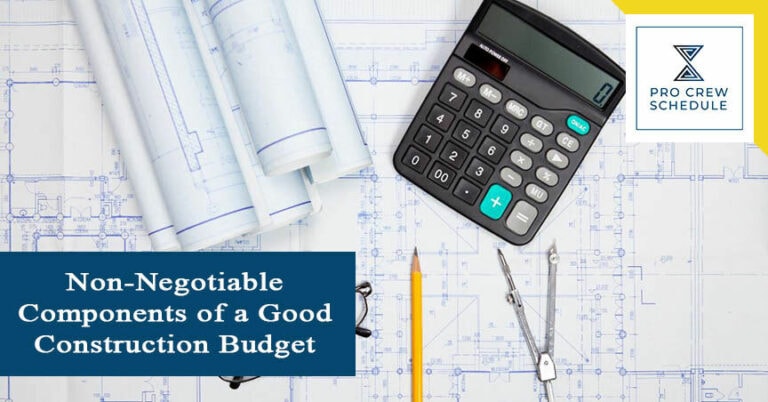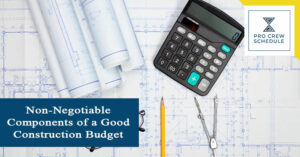Managing construction projects can be summarized in one line: “Deliver the project within budget on time.” If you’ve been in the industry for some time, you’ll realize that these two factors – time and budget – are hinged on each other. One factor cannot compromise the other, or you will end up with a project with unsatisfactory quality. In construction, where the quality of your work translates to the quality of your branding or name, time and budget should be managed properly.
Construction management requires high-level planning, execution, and organization skills. In a time-sensitive industry, proper construction scheduling of milestones with associated costs is needed. To ensure a successful project, construction companies should practice efficient cost management- and this starts with a budget.
How Can Budget Make or Break a Project?
Construction budgeting is a tool used to anticipate the total cost of any project, whether it’s a building, road, or dam. A general contractor develops a budget with the help of a professional estimator and quotes from subcontractors and suppliers. A contractor establishes a budget for accounting purposes for a client or developer, whether a corporation, a private investor, or a government body.
A construction budget can easily determine the timeline of a project – projects with a big budget can be completed at a faster pace than those with a limited budget. As the saying goes, time is gold, especially in construction. A budget also determines the skill level you’ll hire, the caliber of the consultants and subcontractors you’ll get, and the advancement of the tools and equipment you’ll utilize. A good construction budget is thoroughly pre-planned by experts to maximize productivity while keeping overhead costs in check.
Soft Cost vs. Hard Cost
You can use many strategies to plan a project budget, but one of the most common and proven ways is to separate expenses between hard and soft costs. In the accounting dictionary, a project’s soft costs are any expenses that aren’t directly related to the project’s physical infrastructure. You can think of soft costs as any services you need before and after construction. Also known as intangible costs, soft costs usually covers 30% of a construction project’s total budget.
The other 70%, on the other hand, is attributed to hard costs. Known as “brick and mortar” of construction expenses, hard costs are expenses that are directly related to the physical components of the building, dam, bridge, or any given construction project. Since hard costs are tangible — with physical products with associated fixed costs — it’s easier to estimate and manage costs in this category. Hard costs, as compared to soft costs, are easier to estimate since service fees tend to fluctuate due to inflation and other factors.
Now that we’ve clarified the difference between soft and hard costs, we can proceed with all the costs that comprise a construction budget.
Factors to Consider in Creating a Construction Budget
1. Land and Acquisition Cost
Before any building is constructed, the first consideration is where it will be erected. Property or land cost is the beginning of any budget, which varies depending on location. If your chosen location is less desirable, the land cost may only cover 10 of the total budget of your project. Regardless of the land cost, it’s vital that you set a realistic budget for your property investment. Land cost is not only the value of the land – it also includes the real estate fees, financing add-ons, and taxes that may apply to your property investment.
In accounting, the land is a capital cost — a big one-time expenditure that will continue to spread its value for not just a single financial year. Land acquisition costs are crucial to a project’s budget since they will also determine the final product’s profitability once everything is completed. For a new construction project, the value of the land will inevitably increase as years pass, and calculating an accurate cost from the beginning will show you how much the value has increased.
2. Professional Fees and Services
Managing a construction project is not limited to your team – a wide range of professional consulting and services will be needed. Construction projects require a wide range of professional consulting and other services, considered soft costs. Depending on the scope of your construction project, you may need a dozen different professional consultations and approvals before you can proceed with construction. Various professional fees will accumulate throughout the project’s lifecycle, but here is a short list of the initial fees needed during pre-construction:
- Building and Occupancy Permits
- Technical Due Diligence Fees
- Surveying, studying, and testing fees
- Approval from engineers of various trades – Structural, Mechanical, Electrical, Sanitary, etc.
- Banking, Accounting, and Real Estate Fees
- Local waste disposal fees (depending on the area)
- Environmental Fees and Taxes
Getting detailed and accurate design plans is critical to understanding the project’s total costs. Well-established and readable drawings help mitigate any budget issues that come up once construction starts.
3. Building Materials
In managing construction costs, you’ll learn that some expenses are negotiable, and building materials are some. While professional fees and permit expenses are non-negotiable, material cost is what you can tighten and change as needed. Your material expenses are the key area where you can tighten a budget and derive more value from your project. This is because contractors have a chance to establish relationships with suppliers where they can negotiate expenses based on volume and payment terms, especially if they’re able to source multiple materials from a single supplier.
Material expenses take up a big portion of any construction budget regardless of the size, so it’s good to review these very closely. As with any purchase in your life, you get what you pay for. Acquire the best quality materials that can fit within your intended budget. Unlike construction services that can come with scope creep, building materials have fixed costs, and you can get these quoted from your trusted supplier.
3. Labor
A vital aspect of realistic construction budgeting is predicting the total labor costs. Subcontractors, equipment operators, tradespeople, and other professionals will have costs they will ask for just showing up on site.
Labor costs are one of the most difficult expenditures to estimate, and that’s for any industry. Until the project gets started, it’s hard to predict the total amount of hours workers will need to complete the job. However, labor cost estimates are vital to assemble and communicate with workers to keep the crew schedule on track and within budget. Optimizing labor productivity is a good way to maintain the profitability of your construction project.
4. Tools and Equipment
All construction projects will require equipment and tools of various uses to operate. Depending on how tools and equipment are used, they may be considered hard or soft costs. Equipment required for clearing, demolition, grading, and filling lots is used to construct the project. If you own some equipment or tools, these are tagged as capital expenses for accounting purposes.
5. Liability Insurance and Professional Bonds
Construction projects of any size are legally subject to insurance coverage and liability protection, and professional liability insurance is mandatory that must be factored into the overall construction budget. Depending on the nature of your project, a deposit or bid bond may also be required to guarantee that your company will follow through with the project.
6. Utilities
Depending on your project, water, sewer, gas, and electrical installations may be required. These utilities are subject to permit and processing fees that must be considered in the overall construction budget. Local and state-level taxes that are administered by various agencies may also be accounted for. Hire a certified professional accountant experienced in construction finance to straighten your finances, especially taxes.
7. Contingency
Unforeseen costs always arise on any construction project, so estimators intentionally include a contingency budget in any cost schedule. A safe contingency percentage is between 3 and 10 percent of the total construction budget. Depending on the scale, your contingency fund may rise as high as 20 percent of the budget.
8. Project Management
Behind any great construction project is a great project management staff. Project management members would also require their supplies and tools to perform their jobs. The project management cost includes their salaries and their office expenses. Consider costs such as office rent and utilities, phone expenses, internet connection, and supplies like paper, ink, and computer sets. While some project management expenses are considered capital costs — assets used more than a one-time investment — it’s critical to factor their use into any construction budget. This is how you make your business profitable in the long run.
Also included in project management costs is construction management software, like Pro Crew Schedule, that serves as a project’s backbone. Managing construction is easier with a tool that can help you see all the moving parts updated in real-time. Save more money by saving more time by integrating software that can optimize your construction processes.







